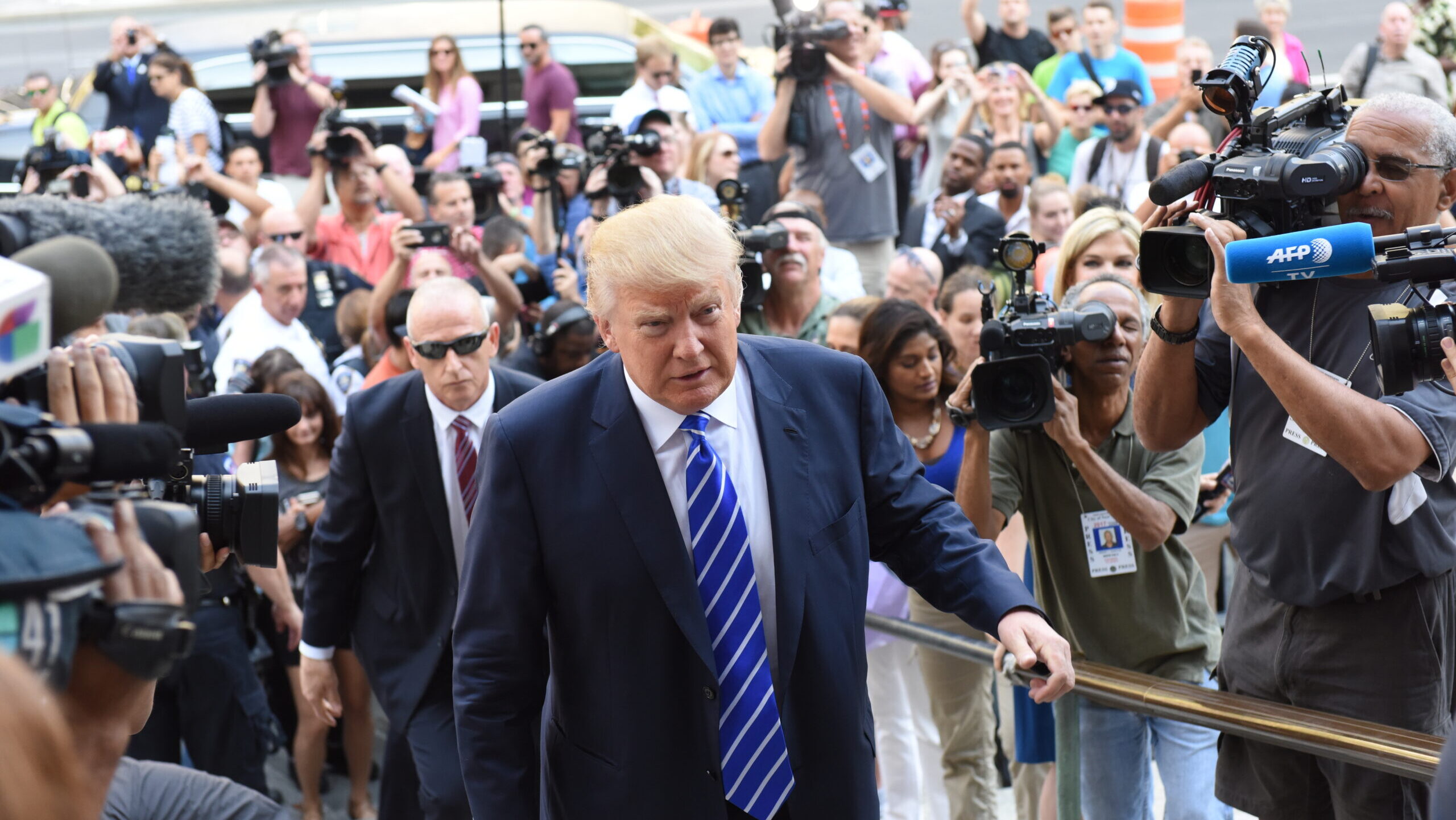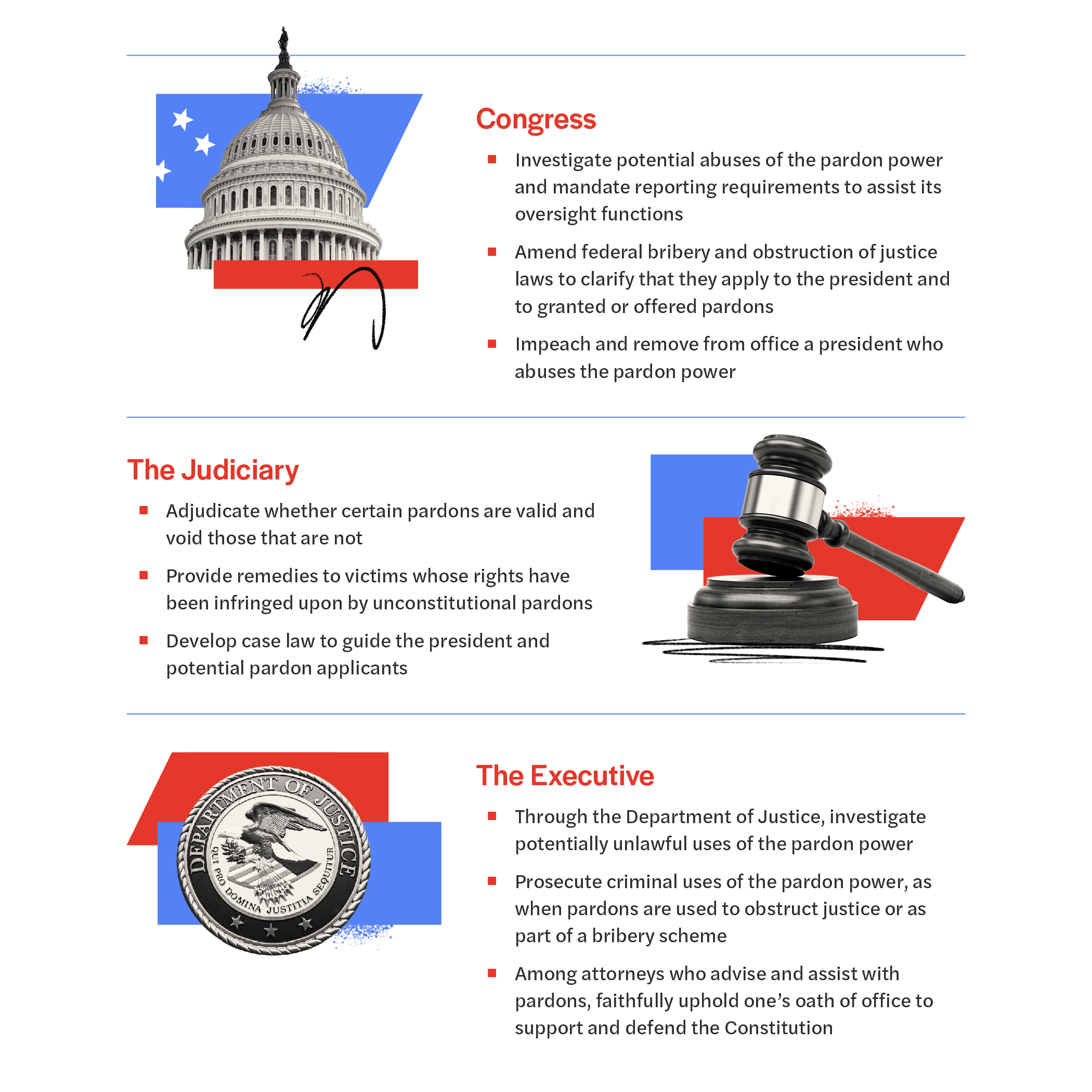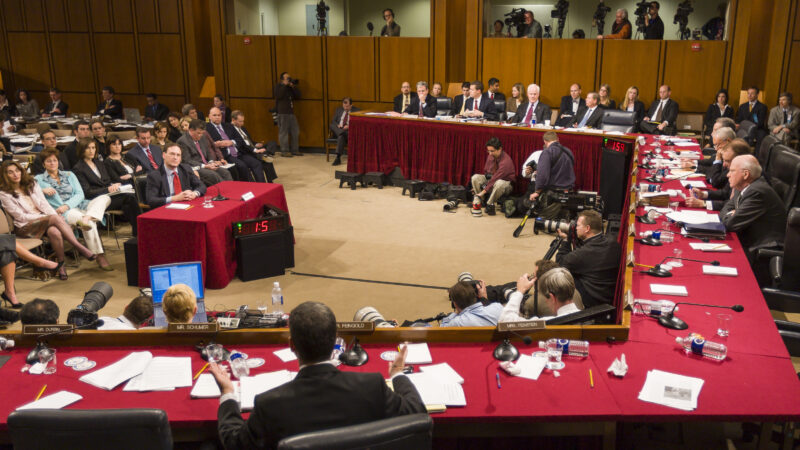Grant Tudor develops and advocates for a range of reforms to shore up our democratic institutions.
Checking the Pardon Power: Preventing & Responding to Abuse
- April 11, 2024

As with any abuses of executive power, each branch of government must protect the Constitution against abusive exercises of the pardon power, including to deter abuses and to hold the president accountable in cases of abuse. The following outlines how each branch can and should do so.
Putting Pardons in Check
Each branch of government has constitutional tools at its disposal to prevent and respond to the pardon power’s abuse.

Read the full report as a PDF Read the full report as a PDF
Congress
First, Congress should employ its extensive oversight tools to investigate potentially unlawful pardons or promises of pardons. Congressional committees may request or subpoena documents and witness testimony to determine the context and intent behind the granting of particular pardons or pardon offers, and can publish reports to ensure transparency and allow for public scrutiny. Congress should also pass legislation that aids specifically in its oversight of pardon abuse, codifying information disclosure requirements that ensure lawmakers have access to materials relevant to their oversight activities.
For instance, through statute, Congress could require that the Department of Justice and White House Counsel submit to it all investigative materials related to an offense for which the president grants or offers to grant a self- or self-protective pardon, as well as records of conversations and materials associated with its consideration. The Protecting Our Democracy Act, passed by the U.S. House during the 117th Congress and re-introduced in the 118th Congress, provides one model, requiring that all materials in relation to a “self-serving” pardon (although not a pardon offer) be disclosed to Congress.1Congress.gov. “Text – H.R.8363 – 116th Congress (2019-2020): Protecting Our Democracy Act.” September 23, 2020. https://www.congress.gov/bill/116th-congress/house-bill/8363/text. While statutory reporting requirements will assist in investigations, or even potential litigation, they can also serve as a deterrent to abuse. The expectation of sunlight—that others will continue investigating the underlying conduct and the potential improper pardon—may dissuade corrupt behavior. Even if a president were not deterred, such requirements may nonetheless deter others who help to implement an unlawful pardon, including Department of Justice or White House officials.
Second, Congress should reiterate that federal bribery and obstruction of justice laws apply to granted or offered pardons to remove any possible argument to the contrary. Congress should clarify that pardons cannot be made in exchange for some benefit or to impact or influence participation in an investigation, and that courts should not view such pardons as valid and enforceable. To correct for any uncertainty that may arise as to whether these laws apply to the president, Congress could preemptively revise relevant federal bribery and obstruction of justice statutes to remove all doubt.2Bob Bauer and Jack Goldsmith elaborate on this recommendation in “The Pardon Power,” Chapter 6 in After Trump: Reconstructing the Presidency. Washington, DC: Lawfare Press, 2020. (The Protecting Our Democracy Act clarifies that the federal bribery statute applies to the president and vice president and that pardons and offers of pardons can constitute bribes.3Congress.gov. “Protecting Our Democracy Act.”)
Third, Congress should delimit the constitutional boundaries of the pardon power through a Sense of Congress resolution. While non-binding, the resolution would clarify the legislature’s understanding of appropriate limits of the president’s power in order to uphold the Constitution. Such a resolution could consider various limitations as outlined in this paper. However, pardons that place a president above the law present a direct threat to Congress as a co-equal branch of government by upending our system of checks and balances. As such, Congress should at minimum clarify that pardons that place the president above the law through a self-pardon, or through a self-protective pardon that amounts to a self-pardon, would pose a threat to the constitutional order.
The expectation of sunlight—that others will continue investigating the underlying conduct and the potential improper pardon—may dissuade corrupt behavior.
Ultimately, if Congress identifies abuses of the pardon power, it may use its impeachment authorities to protect the Constitution. There is no doubt that misuse of the pardon power—like other abuses of presidential powers—can be a proper basis for impeachment.4History, Art & Archives, Impeachment, U.S. House of Representatives. https://history.house.gov/Institution/Origins-Development/Impeachment/
Each of these recommendations are well within Congress’s constitutional powers. If the president uses the pardon power to violate the law or subvert the Constitution, Congress can and should use its lawful authorities to deter and respond. Congress, of course, has the power to pass federal criminal laws (such as anti-bribery statutes), and through the Necessary and Proper Clause,5U.S. Const. art. I, § 8, cl. 18. to ensure that those laws are properly implemented. Congress also has broad powers to “inquire into and publicize corruption, maladministration or inefficiency in agencies of the Government.”6Watkins v. United States, 354 U.S. 178, 200 n.33 (1957); see also McGrain v. Daugherty, 273 U.S. 135, 161 (1927) (explaining that Congress’s “legislative powers” include the power to obtain any “needed information”).Thus, Congress undoubtedly has the power to require reporting7Any concerns that some of the materials regarding pardons might be privileged do not implicate the constitutionality of these proposals. The privileges possibly implicated in materials regarding pardons are complex, and as the Office of Legal Counsel acknowledges, whether they apply is dependent on the fact-specific context. See, e.g., Office of Legal Counsel, “Assertion of Executive Privilege Concerning Counsel’s Interviews of the Vice President and Senior White House Staff,” July 15, 2008. Moreover, executive privilege is also not absolute, and can be overcome when the information is “demonstrably critical to the responsible fulfillment of the Committee’s functions.” Senate Select Comm. on Presidential Campaign Activities v. Nixon, 498 F.2d 725, 731 (D.C. Cir. 1974) (en banc). Thus, whether any materials that Congress seeks would be covered by the privilege, and whether that privilege could be overcome, cannot be assessed ahead of time, and would not implicate the constitutionality of any bill. Rather, should the White House believe that it cannot provide any specific materials due to executive privilege, it would need to assert that privilege at the time, and adjudicate that matter—through negotiation with Congress or through litigation—based on the specific facts at issue. so that it can bring those constitutional violations to light and, where appropriate, act on its constitutional prerogative to pass legislation preventing such constitutional violations in the future.8See generally, Andrew Kent. “Can Congress Do Anything about Trump’s Abuse of the Pardon Power?” Lawfare, July 24, 2020. https://www.lawfaremedia.org/article/can-congress-do-anything-about-trumps-abuse-pardon-power.
The JudiciaryThe Judiciary
Federal courts must also play a role as a constitutional check on abuses of the pardon power. As the branch of government entrusted to consider all cases arising under the Constitution and to safeguard individual rights, federal courts in appropriate cases have the power to adjudicate whether certain pardons are valid and to void those that are not.
The Pardon Clause details certain limits explicitly, including that presidents may only pardon “Offenses against the United States,” or federal crimes (i.e., state crimes and civil liability are not pardonable), and that presidents may not use the power in “Cases of Impeachment.”9U.S. Const. art. II, § 2, cl. 1 But for over two centuries, federal courts have also articulated other limitations—particularly when uses of the power would “offend the Constitution.”10Schick v. Reed, 419 U.S. 256 (1974). That is, beyond the Pardon Clause’s explicit limitations, courts have held that uses of the pardon power that undermine other parts of the Constitution may also be impermissible. For instance, federal courts have ruled that a pardon cannot violate certain constitutional powers vested in Congress,11Illinois R. CO. v. Bosworth, 133 U.S. 92 (1890). and cannot require that individuals forfeit certain constitutional rights12Hoffa v. Saxbe, 378 F. Supp. 1221 (D.D.C. 1974). in order to receive a pardon.
Courts opining on the validity of pardons may invalidate unconstitutional pardons, provide remedies to victims whose rights have been infringed upon, and develop case law to guide the president and potential pardon applicants.
The ExecutiveThe Executive
Officials within the executive branch also have a critical role to play should a president use the pardon power to violate generally applicable federal criminal laws.
Across administrations, the Department of Justice has opened investigations into presidential misconduct. And while it remains subject to debate as to whether a sitting president may be indicted, both the executive branch13Moss. “A Sitting President’s Amenability…” and federal courts14Polantz and Rabinowitz. “Federal Judge Says Trump…” have made clear that presidents are subject to prosecution upon leaving. Investigations by the Department of Justice have included examining whether presidents have used official acts to potentially commit crimes, including use of the pardon power. In 2001, the U.S. Attorney for the Southern District of New York opened a criminal investigation into former President Clinton, assisted by the FBI, examining whether his pardon of financier Marc Rich was given in exchange for money. Rich received a pardon after his ex-spouse donated to both the Clinton Presidential Library and the Democratic Party.15Erb. “Blast from the Past…” Had the investigation found that Clinton granted a pardon in exchange for something of value, the former president could have been indicted for violating federal bribery law.
Presidents are not exempted from federal criminal laws; and official acts, including the granting of pardons, can be used to violate those laws. As the chief agency within the branch of government entrusted with enforcing the law, it is incumbent upon the Department of Justice to investigate abuses of the pardon power that may include potential criminal misconduct.
Finally, various executive branch attorneys, including those in the Office of the Pardon Attorney in the Department of Justice and in the Office of White House Counsel, participate in the process of advising the president on matters related to pardons and ensuring the execution of pardons. As with presidents themselves, those attorneys swear an oath of office to “support and defend the Constitution of the United States.”16“5 U.S. Code § 3331 – Oath of office.” Legal Information Institute. Accessed March 6, 2024. https://www.law.cornell.edu/uscode/text/5/3331#:~:text=An%20individual%2C%20except%20the%20President,enemies%2C%20foreign%20and%20domestic%3B%20that Abiding by those oaths requires affirmatively acting in service of the Constitution, and not in service of a president who, through abuse of the pardon power, would subvert it.
ConclusionConclusion
The pardon power is not unlimited. It cannot be used to place the president above the law; to subvert other parts of the Constitution, including constitutional rights; to violate criminal law with impunity; or to license future lawbreaking on the president’s behalf. Like any executive power, it is constrained by the rest of the Constitution, including the duties imposed upon the president to act in the public interest.
However, constraints remain theoretical unless and until those vested with the authorities to effectuate them do so. Congress, the judiciary, and the executive branch itself each have access to critical constitutional tools to appropriately constrain the pardon power in order to prevent its abuse. The specter of any president who intends to abuse the power, or who attempts to do so, must prompt swift responses within our system of checks and balances.
The prospect of pardon abuse and others’ authorities to prevent it are neither new nor unique to the U.S. The legislature’s prerogative to circumscribe the executive’s pardon power finds its roots in 13th century England. Kings were vested with a plenary power to grant pardons, which Parliament delimited over time. For instance, the Statute of Northampton in 1328 “laid down a general restraint calling for the king not to grant a pardon except where it was consistent with his oath.”17Stanley Grupp. “Some Historical Aspects of the Pardon in England.” The American Journal of Legal History 7, no. 1 (1963): 56. https://doi.org/10.2307/844083. The 1689 Bill of Rights suspended the Crown’s authority to use its powers, including the power to pardon, in ways that disregarded laws passed by Parliament.18Id. at 57.
The Framers imported this executive power for both noble and prudent reasons. They also constructed a constitutional system designed to prevent its abuse through both express and structural limitations. The Constitution’s guarantees of individual rights, a faithful executive, and checks through judicial and congressional powers provide for meaningful and necessary constraints together with the tools to enforce them.
Related Content
Join Us.
Building a stronger, more resilient democracy is possible, but we can’t do it alone. Become part of the fight today.
Donate
Sign Up for Updates Sign Up for Updates
Explore Careers Explore Careers
How to Protect Democracy How to Protect Democracy



